八年级下册英语(苏教版八年级)8BU5-Grammar语言点
(完整版)八年级下册英语(苏教版八年级)8BU2Grammar语言点
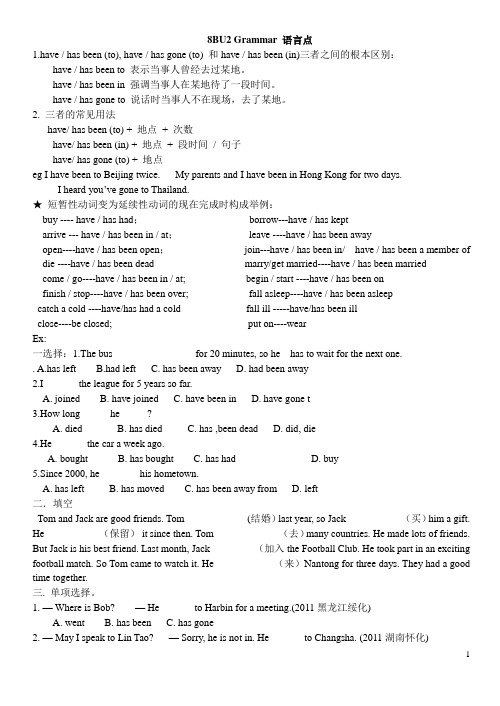
8BU2 Grammar 语言点1.have / has been (to), have / has gone (to) 和have / has been (in)三者之间的根本区别:have / has been to 表示当事人曾经去过某地。
have / has been in 强调当事人在某地待了一段时间。
have / has gone to 说话时当事人不在现场,去了某地。
2. 三者的常见用法have/ has been (to) + 地点+ 次数have/ has been (in) + 地点+ 段时间/ 句子have/ has gone (to) + 地点eg I have been to Beijing twice. My parents and I have been in Hong Kong for two days.I heard you’ve gone to Thailand.★短暂性动词变为延续性动词的现在完成时构成举例:buy ---- have / has had;borrow---have / has keptarrive --- have / has been in / at;leave ----have / has been awayopen----have / has been open;join---have / has been in/ have / has been a member of die ----have / has been dead marry/get married----have / has been marriedcome / go----have / has been in / at; begin / start ----have / has been onfinish / stop----have / has been over; fall asleep----have / has been asleepcatch a cold ----have/has had a cold fall ill -----have/has been illclose----be closed; put on----wearEx:一选择:1.The bus ________________for 20 minutes, so he has to wait for the next one.. A.has left B.had left C. has been away D. had been away2.I ______ the league for 5 years so far.A. joinedB. have joinedC. have been inD. have gone t3.How long _____ he _____?A. diedB. has diedC. has ,been deadD. did, die4.He ______ the car a week ago.A. boughtB. has boughtC. has hadD. buy5.Since 2000, he _______ his hometown.A. has leftB. has movedC. has been away fromD. left二.填空Tom and Jack are good friends. Tom ____________(结婚)last year, so Jack ___________(买)him a gift. He ___________(保留)it since then. Tom ____________ (去)many countries. He made lots of friends. But Jack is his best friend. Last month, Jack _________(加入the Football Club. He took part in an exciting football match. So Tom came to watch it. He___________ (来)Nantong for three days. They had a good time together.三. 单项选择。
八年级下册英语(苏教版八年级)8BU3 Grammar语言点
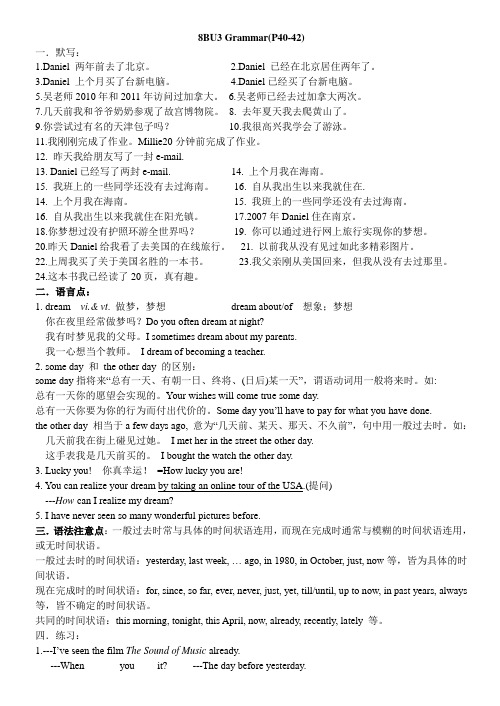
8BU3 Grammar(P40-42)一.默写:1.Daniel 两年前去了北京。
2.Daniel 已经在北京居住两年了。
3.Daniel 上个月买了台新电脑。
4.Daniel已经买了台新电脑。
5.吴老师2010年和2011年访问过加拿大。
6.吴老师已经去过加拿大两次。
7.几天前我和爷爷奶奶参观了故宫博物院。
8. 去年夏天我去爬黄山了。
9.你尝试过有名的天津包子吗?10.我很高兴我学会了游泳。
11.我刚刚完成了作业。
Millie20分钟前完成了作业。
12. 昨天我给朋友写了一封e-mail.13. Daniel已经写了两封e-mail. 14. 上个月我在海南。
15. 我班上的一些同学还没有去过海南。
16. 自从我出生以来我就住在.14. 上个月我在海南。
15. 我班上的一些同学还没有去过海南。
16. 自从我出生以来我就住在阳光镇。
17.2007年Daniel住在南京。
18.你梦想过没有护照环游全世界吗?19. 你可以通过进行网上旅行实现你的梦想。
20.昨天Daniel给我看了去美国的在线旅行。
21. 以前我从没有见过如此多精彩图片。
22.上周我买了关于美国名胜的一本书。
23.我父亲刚从美国回来,但我从没有去过那里。
24.这本书我已经读了20页,真有趣。
二.语言点:1. dream vi.& vt. 做梦,梦想dream about/of 想象;梦想你在夜里经常做梦吗?Do you often dream at night?我有时梦见我的父母。
I sometimes dream about my parents.我一心想当个教师。
I dream of becoming a teacher.2. some day 和the other day 的区别:some day指将来“总有一天、有朝一日、终将、(日后)某一天”,谓语动词用一般将来时。
如:总有一天你的愿望会实现的。
Your wishes will come true some day.总有一天你要为你的行为而付出代价的。
八年级下册英语(苏教版八年级)8BU8 Reading语言点
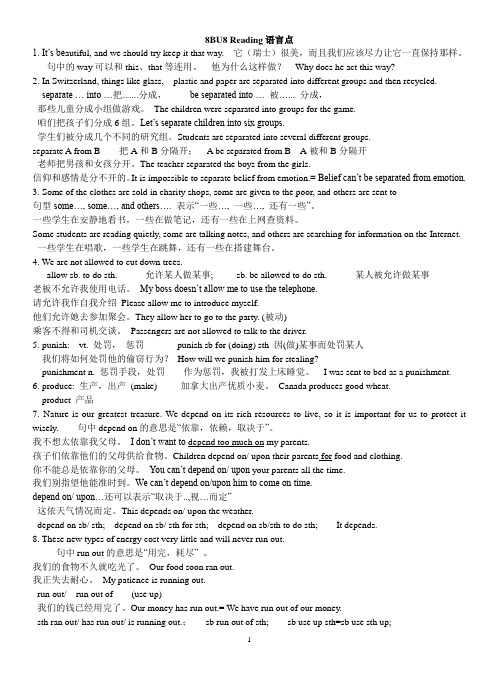
8BU8 Reading语言点1. It’s be autiful, and we should try keep it that way. 它(瑞士)很美,而且我们应该尽力让它一直保持那样。
句中的way可以和this、that等连用。
他为什么这样做?Why does he act this way?2. In Switzerland, things like glass, plastic and paper are separated into different groups and then recycled. separate … into …把…...分成,be separated into …被…... 分成,那些儿童分成小组做游戏。
The children were separated into groups for the game.咱们把孩子们分成6组。
Let’s separate children into six groups.学生们被分成几个不同的研究组。
Students are separated into several different groups.separate A from B 把A和B分隔开; A be separated from B A被和B分隔开老师把男孩和女孩分开。
The teacher separated the boys from the girls.信仰和感情是分不开的。
It is impossible to separate belief from emotion.= Belief can’t be separated from emotion.3. Some of the clothes are sold in charity shops, some are given to the poor, and others are sent to句型some…, some…, and others…. 表示“一些…, 一些…, 还有一些”。
苏版初二(下)英语:unit5语法篇(教师版)
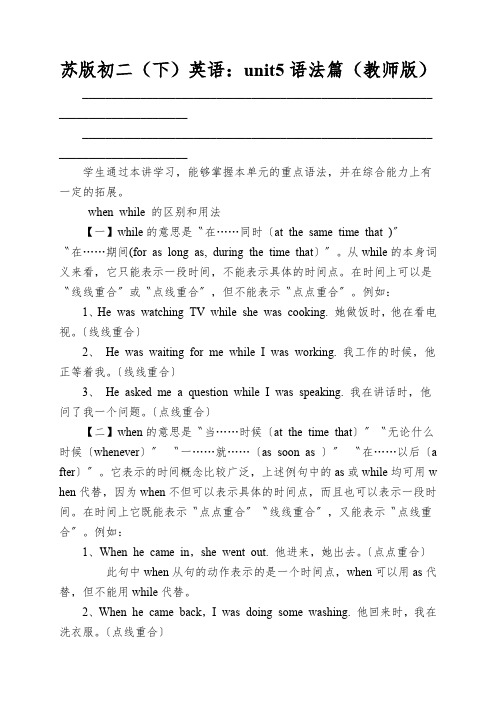
苏版初二(下)英语:unit5语法篇(教师版)____________________________________________________________ __________________________________________________________________________________ ______________________学生通过本讲学习,能够掌握本单元的重点语法,并在综合能力上有一定的拓展。
when while 的区别和用法【一】while的意思是〝在……同时〔at the same time that )〞〝在……期间(for as long as, during the time that〕〞。
从while的本身词义来看,它只能表示一段时间,不能表示具体的时间点。
在时间上可以是〝线线重合〞或〝点线重合〞,但不能表示〝点点重合〞。
例如:1、He was watching TV while she was cooking. 她做饭时,他在看电视。
〔线线重合〕2、He was waiting for me while I was working. 我工作的时候,他正等着我。
〔线线重合〕3、He asked me a question while I was speaking. 我在讲话时,他问了我一个问题。
〔点线重合〕【二】when的意思是〝当……时候〔at the time that〕〞〝无论什么时候〔whenever〕〞〝一……就……〔as soon as 〕〞〝在……以后〔a fter〕〞。
它表示的时间概念比较广泛,上述例句中的as或while均可用w hen代替,因为when不但可以表示具体的时间点,而且也可以表示一段时间。
在时间上它既能表示〝点点重合〞〝线线重合〞,又能表示〝点线重合〞。
例如:1、When he came in,she went out. 他进来,她出去。
八年级下册英语(苏教版八年级)8BU5 Integrated skills 语言点
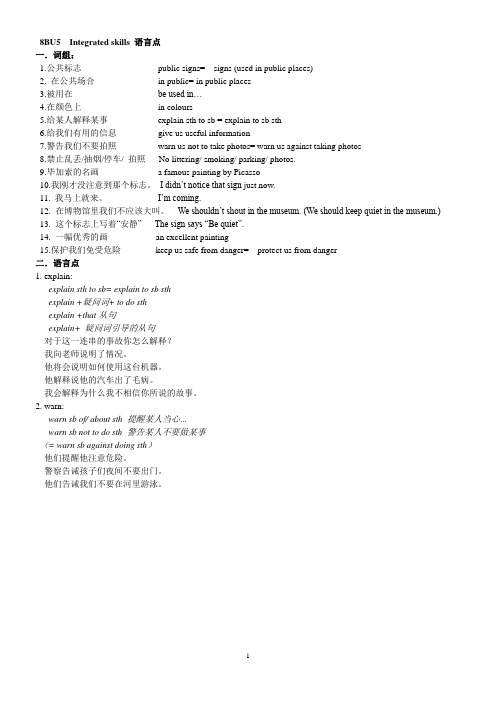
8BU5 Integrated skills 语言点一.词组:1.公共标志public signs= signs (used in public places)2. 在公共场合in public= in public places3.被用在be used in…4.在颜色上in colours5.给某人解释某事explain sth to sb = explain to sb sth6.给我们有用的信息give us useful information7.警告我们不要拍照warn us not to take photos= warn us against taking photos8.禁止乱丢/抽烟/停车/ 拍照No littering/ smoking/ parking/ photos.9.毕加索的名画 a famous painting by Picasso10.我刚才没注意到那个标志。
I didn’t notice that sign just now.11. 我马上就来。
I’m coming.12. 在博物馆里我们不应该大叫。
We shouldn’t shout in the museum. (We should keep quiet in the museum.)13. 这个标志上写着“安静”The sign says “Be quiet”.14. 一幅优秀的画an excellent painting15.保护我们免受危险keep us safe from danger= protect us from danger二.语言点1. explain:explain sth to sb= explain to sb sthexplain +疑问词+ to do sthexplain +that从句explain+ 疑问词引导的从句对于这一连串的事故你怎么解释?我向老师说明了情况。
他将会说明如何使用这台机器。
八年级下册英语(苏教版八年级)8BU8 Integrated skills语言点

8BU8 Integrated skills1.How green are you? 你有多环保?2.how to go green=how to protect the environment 如何去环保3.do a survey on sth/sb 对…进行调查4.turn off the tap when brushing teeth 刷牙时关上水龙头5.take showers for less than ten minutes 洗澡少于十分钟e both sides of the paper 使用纸的双面7.recycle empty bottles 循环利用空瓶子8.take one’s own bags to the supermarket 自己带袋子去超市9.one’s daily habits 某人的日常习惯10.Here are the results of the survey. 这里就是调查的结果。
11.It is great that +从句= It is great for sb to do sth 某人做某事很好12.few students 很少的学生 a few students 一些学生13.only a few students 只有一些学生14.quite a few students= many students 相当多的学生15.do a lot to help protect the environment 为了帮助保护环境做了许多事16.there are still many more things they can do. 仍然有许多他们能做的事17.try our best to do 尽我们的所能去做18.look nicer with more trees around 周围有很多树看起来更美19.trees can reduce dust. 树能减少灰尘20.be harmful to our health 对我们的健康有害21.be harmful to= do harm to= be bad for 对…有害22.be harmless to 对…无害23.keep soil in place 保持水土(不流失)24.provide home for animals 为动物提供家园Study skills1.turn off the gas 关掉煤气2.depend on natural resources to live 依赖自然资源生存3.natural gas 天然气4.not only…but (also)… 不仅…而且5.be useful for sb/ sth 对…有用6.have a wider use for factories 对工厂有更广泛的用途7.be dug up from the ground 从地下挖掘出来8.form 形成(form the habit of doing sth)9.as a result=so 结果,因此e sth wisely 聪明地使用…11.take proper action to do sth 采取适当的措施去做某事12.produce less waster 产生更少的废物13.reuse=use again14.if possible=if it is possible 如果可能。
八年级下册英语(苏教版八年级)8BU1 Grammar语言点
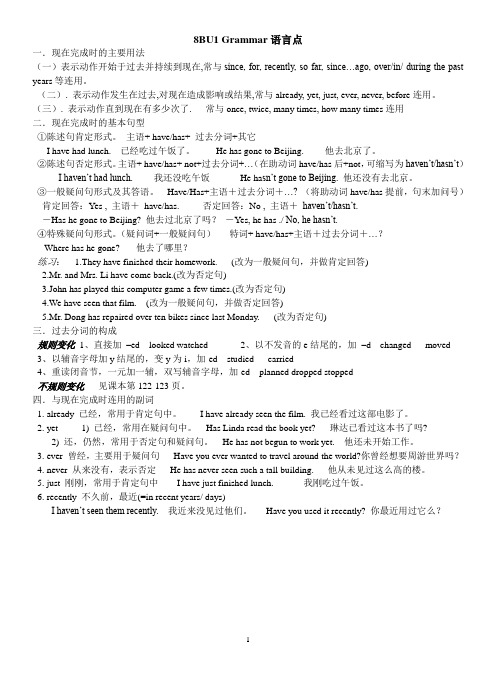
8BU1 Grammar语言点一.现在完成时的主要用法(一)表示动作开始于过去并持续到现在,常与since, for, recently, so far, since…ago, over/in/ during the past years等连用。
(二). 表示动作发生在过去,对现在造成影响或结果,常与already, yet, just, ever, never, before连用。
(三). 表示动作直到现在有多少次了. 常与once, twice, many times, how many times连用二.现在完成时的基本句型①陈述句肯定形式。
主语+ have/has+ 过去分词+其它I have had lunch. 已经吃过午饭了。
He has gone to Beijing. 他去北京了。
②陈述句否定形式。
主语+ have/has+ not+过去分词+…(在助动词have/has后+not,可缩写为haven’t/hasn’t)I haven’t had lunch. 我还没吃午饭He ha sn’t gone to Beijing. 他还没有去北京。
③一般疑问句形式及其答语。
Have/Has+主语+过去分词+…?(将助动词have/has提前,句末加问号)肯定回答:Yes , 主语+have/has. 否定回答:No , 主语+haven’t/hasn’t.-Has he gone to Beijing? 他去过北京了吗?-Yes, he has ./ No, he hasn’t.④特殊疑问句形式。
(疑问词+一般疑问句)特词+ have/has+主语+过去分词+…?Where has he gone? 他去了哪里?练习: 1.They have finished their homework. (改为一般疑问句,并做肯定回答)2.Mr. and Mrs. Li have come back.(改为否定句)3.John has played this computer game a few times.(改为否定句)4.We have seen that film. (改为一般疑问句,并做否定回答)5.Mr. Dong has repaired over ten bikes since last Monday. (改为否定句)三.过去分词的构成规则变化1、直接加–ed looked watched 2、以不发音的e结尾的,加–d changed moved3、以辅音字母加y结尾的,变y为i,加-ed studied carried4、重读闭音节,一元加一辅,双写辅音字母,加-ed planned dropped stopped不规则变化见课本第122-123页。
八年级下册英语苏教版八年级语言点

八年级下册英语苏教版八年级语言点8BU3 Reading语言点1. notice: 注意到,看到; notice sb do / doing sth; notice that…我没注意到有烟。
我注意到他离开了房子。
我注意到他正在看小说(novel)他注意到有人正在看他。
n. 通知,通告,布告牌上有一个最新通知。
图标 the QQ icon; the tour icon; the back icon3. at the top of ... 在……的顶部山上有座塔。
她正站在楼梯的顶端。
She was standing at the top of the stairs.--反义:at the bottom of… 在…的底部在这一页的底部有一幅漂亮的图片。
There is a beautiful picture at the bottom of the page.你可以在屏幕的下方找到答案。
You can find the answers at the bottom of the screen.一些人在河底部找到了一个宝盒。
Some people found a treasure box at the bottom of the river.3. click on... 点击……4. Asia, Africa, America, Europe adj. Asian African American Europeana European girl/ friend, a European city/ country/ flight世界著名的,举世闻名的姚明是世界著名的篮球运动员。
6. trade n. (不可数) 贸易 WTO: the World Trade Organization国际贸易international trade; 对外贸易foreign trade; 军火贸易the arms trade两国之间的贸易增加了。
八年级下册英语(苏教版八年级)8BU4 Grammar 语言点

8BU4 Grammar 语言点Grammar I:疑问词+to-infinitive (疑问词+动词不定式)一.疑问词+动词不定式疑问词: 可以是所有的疑问词(除why外)二. 常和此结构连用的动词及动词短语有:know, learn, see, hear, ask, tell, decide, explain, find out, forget, remember, understand 等。
三. “疑问词+动词不定式” 结构可以改写成由该疑问词引导的从句。
I don’t kn ow what to do.= I do not know what I should do.四. 这种结构在句中可以做宾语,主语和表语.五.有些疑问词,如what, which, whose, how many, how much等,其后可以先接一个名词,再接动词不定式。
I don’t know which topic to choose. 我不知道选哪个题目。
在“疑问词+ 动词不定式”结构前,有时也可以是如sure, clear等的形容词。
I am not sure which way to take. 我不确定走哪条路。
六. 疑问词+to do sth +介词注意:who to look after what to write with七. 疑问词引导的宾语从句(从句要用陈述句语序)What do you think of the book? I don’t know what you think of the book.Grammar II must; have to一. must 肯定和否定形式must 表主观的义务和必要,主要用于肯定句和疑问句,“必须,得,要”。
must 的否定形式must not (mustn’t)表示禁止,“不能,不行,不可以”。
e.g. You must finish your homework today. 你今天必须完成家庭作业。
八年级下册英语(苏教版八年级)8BU5 Welcome语言点
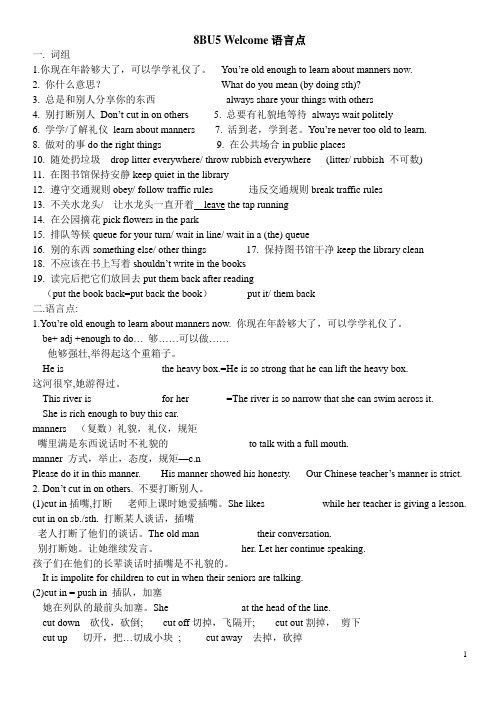
8BU5 Welcome语言点一. 词组1.你现在年龄够大了,可以学学礼仪了。
You’re old enough to learn about manners now.2. 你什么意思?What do you mean (by doing sth)?3. 总是和别人分享你的东西always share your things with others4. 别打断别人Don’t cut in on others5. 总要有礼貌地等待always wait politely6. 学学/了解礼仪learn about manners7. 活到老,学到老。
You’re never too old to learn.8. 做对的事do the right things 9. 在公共场合in public places10. 随处扔垃圾drop litter everywhere/ throw rubbish everywhere (litter/ rubbish 不可数)11. 在图书馆保持安静keep quiet in the library12. 遵守交通规则obey/ follow traffic rules 违反交通规则break traffic rules13. 不关水龙头/ 让水龙头一直开着leave the tap running14. 在公园摘花pick flowers in the park15. 排队等候queue for your turn/ wait in line/ wait in a (the) queue16. 别的东西something else/ other things 17. 保持图书馆干净keep the library clean18. 不应该在书上写着shouldn’t write in the books19. 读完后把它们放回去put them back after reading(put the book back=put back the book)put it/ them back二.语言点:1.You’re old enough to learn abou t manners now. 你现在年龄够大了,可以学学礼仪了。
苏教版八年级下册英语知识点汇总

苏教版八年级下册英语知识点汇总一、词汇与短语1.高级词汇与短语:继续扩展词汇量,涵盖更复杂的主题,如社会议题、科技发展、环境保护、历史事件等,同时学习并熟练运用相关的短语和固定搭配。
2.同义词与反义词:学习并区分同义词和反义词,提高词汇使用的准确性和丰富性。
二、语法知识1.时态综合运用:o深入理解和熟练运用各种时态,包括过去完成时、现在完成进行时等,理解其在不同语境中的用法。
o复习并巩固之前学过的时态,如一般现在时、一般过去时、一般将来时等,确保学生能够灵活运用。
2.从句深化:o学习并掌握定语从句、宾语从句、表语从句等复杂从句的用法和构成,理解其在句子中的作用。
o复习状语从句,特别是条件状语从句、时间状语从句、原因状语从句等,提高从句的综合运用能力。
3.语态与语气:o复习并巩固被动语态的用法,学习并掌握不同时态下的被动语态形式。
o引入虚拟语气的概念,学习其在条件句、建议、愿望等语境中的用法。
4.非谓语动词高级用法:进一步学习非谓语动词(动名词、不定式、分词)的高级用法,如作主语、宾语、表语、定语、状语等。
三、听力与口语1.听力理解深化:通过更复杂的听力材料(如长对话、短文、讲座、演讲等),提高学生的听力理解能力,包括捕捉细节、理解主旨、推断隐含意义等。
2.口语表达流利性:加强口语训练,通过模拟真实场景、角色扮演、小组讨论等形式,提高学生的口语表达能力和流利性。
3.发音与语调:继续注重发音的准确性和语调的自然性,通过模仿、跟读、录音对比等方式,提高学生的语音语调水平。
四、阅读与写作1.阅读策略与技巧:教授学生使用各种阅读策略(如预测、略读、寻读、推断等)和技巧,提高阅读效率和深度。
2.阅读理解能力提升:通过阅读不同体裁和难度的文章(如新闻报道、科普文章、文学作品等),提高学生的阅读理解能力,包括理解主旨大意、细节信息、作者观点等。
3.写作技巧与结构:学习并掌握不同文体的写作技巧和结构(如议论文、说明文、叙事文等),通过写作练习,提高学生的写作能力。
最新苏教版英语八年级下册知识点总结

最新苏教版英语八年级下册知识点总结
一、语法知识点
1. 时态:包括一般现在时、一般过去时、一般将来时等。
2. 从句:包括名词性从句、定语从句和状语从句等。
3. 宾语从句:介绍如何将一个句子作为宾语引入主句中。
4. 被动语态:介绍如何将主动语态转变为被动语态。
5. 倒装:主谓倒装和部分倒装的用法。
二、词汇知识点
1. 同义词与反义词:研究一些常见词汇的同义词和反义词。
2. 词性转换:研究名词、动词、形容词和副词之间的转换规则。
3. 词组搭配:研究一些常用的词组搭配用法。
4. 惯用语:研究一些固定表达和惯用语的用法。
三、阅读技巧
1. 掌握猜词义的技巧:通过上下文及其他线索来猜测单词的意思。
2. 快速阅读:提高阅读速度和理解力的方法。
3. 标记关键信息:通过标记或记笔记来记录文章中的关键信息。
4. 推理判断:通过阅读理解文章中的信息来进行推理判断。
四、写作技巧
1. 作文结构:研究如何组织作文的结构,包括引言、主体和结
论部分。
2. 写作要点:研究如何明确表达自己的观点和论据。
3. 句子连贯:研究如何使用过渡词和连接词使句子更连贯。
4. 语法准确性:注意语法错误,包括主谓一致、时态一致等。
以上就是最新苏教版英语八年级下册的知识点总结。
通过学习
这些知识点,可以提高英语学习的效果,加深对英语语法、词汇、
阅读和写作等方面的理解和运用能力。
希望对大家的学习有所帮助!。
江苏译林牛津八年级英语下册第5单元语言知识点总结讲解课件-(共116张PPT)

8B U5 章节小测
基础知识回顾
PPeerriioodd 11 CCoommiicc ssttrriipp && WWeellccoommee ttoo tthhee uunniitt
根据句意用所给词的适当形式填空 1.It is good manners ( manner ) to give seats to the elderly on the bus. 2.Cindy obeyed ( obey ) her mother without question when she was young. 3.My grandma is too old to go ( go ) to work. 4.It’s not my turn to speak ( speak ) in front of the class. 5.It’s impolite ( polite ) to make noise in the library.
挡住某人的路 劳驾 也,还有 一直,总是 偶然,意外地
词汇精讲
8B U5 词汇精讲
Period 2 Reading
高频词汇
proper (adj.) 适当的;正确的
他们将在适当的时间再次参观这个国家。
They will visit the country again at a proper time.
8B U5 词汇精讲
Period 1 Comic strip & Welcome to the unit
高频词汇
关于“pick”的短语补充
pick out
(1)选出 (2) 挑出
(3) 区别出 (4) 看出
8B U5 词汇精讲
Period 1 Comic strip & Welcome to the unit
八年级英语下册U5—U8语法归纳

八年级英语下册U5—U8语法归纳1 The Objective Clauses(宾语从句)①概念:在句子中起宾语作用的从句叫做宾语从句。
②宾语从句的三要素:连接词,语序,时态连接词:A.由that引导的宾语从句---注:that 在句中无词汇意义,在从句中不充当成分,在口语当中往往省略。
B.由从属连词whether, if 引导的宾语从句---if/whether 引导宾语从句,表示“是否”之义,在句中不充当句子成份,if/whether可互换。
当句末为or not时,引导词只能用whether而不能用if.C.当宾语从句是特殊疑问句时,连接词就用原来的疑问词,但从句一定要注意用陈述语序。
语序:陈述句结构(主+谓+其他成分)时态:1.如果主句的时态是一般现在时,宾语从句的时态根据具体情况来确定,可以是任何时态。
2.如果主句的时态是一般过去时,宾语从句只能用相应的过去的时态(一般过去时,过去进行时,过去将来时,过去完成时)。
3. 如果宾语从句所陈述的是客观真理,即使主句用了过去时,从句仍用现在时态。
否定转移:在含有宾语从句的主从复合句中,当主句的主语为第一人称,谓语动词是think,believe, guess, suppose 等时,要将从句的否定词转移到主句中,即主句的谓语动词用否定式,宾语从句的谓语动用肯定式。
例1:汤姆说他想要和校长说话。
例2:没有人知道明天是否会下雨。
例3:我不理解他们为什么会如此的喜欢电脑游戏。
例4:你知道我们什么时候开运动会吗?例5:老师告诉我们地球围绕着太阳转。
例6:打扰一下,你可以告诉我我应该如何到达邮局吗?1.Exclamatory statements(感叹句)感叹句是表示赞美、惊叹、喜悦、等感情的句子,通常以what, how引导。
what修饰名词,how 修饰形容词,副词或动词。
①感叹句可由“what+名词+主语+谓语……!”构成。
what引导的感叹句还可分为以下三类:A.What +a/an+形容词+可数名词单数!例7:他是一个多么聪明的小男孩啊!B.What+形容词+复数可数名词!例8:他们真是好学生!C.What+形容词+不可数名词!例9:今天天气多冷啊!②还有一类感叹句是由how引导,常有以下几类:A.How+形容词+……!例10:这个婴儿多么可爱啊!B.How+副词+……!例11:他工作多么努力啊!2.The usage of”used to”(used to 的用法)①used to 意为“过去常常”,可看作助动词或情态动词,其后跟动词原形,表示过去习惯或经常发生的动作或状态。
苏教版八下英语第八单元知识点

苏教版八下英语第八单元知识点苏教版八下英语第八单元知识点1. Unit Overview•This unit focuses on discussing environmental problems and offering solutions.•Learners will expand their vocabulary related to the environment and learn about grammar structures toexpress suggestions and advice.2. Vocabulary•Pollution–Air pollution–Water pollution–Noise pollution•Environmental problems–Deforestation–Global warming–Climate change–Ozone depletion•Natural resources–Fossil fuels–Renewable energy–Solar energy–Wind energy–Hydroelectric power•Solutions and actions–Recycle–Reduce–Reuse–Conserve3. Grammar•Expressing suggestions–“You should/ought to + verb” - giving advice–“Why don’t you + verb” - making suggestions–“If I were you, I would + verb” - offering advice•Modals for recommendations and obligations–“We should/shouldn’t + verb” - expressingrecommendations–“We must/mustn’t + verb” - expressingobligations–“We have to/have to + verb” - expressingnecessity4. Listening Skills•Improve your listening skills by actively listening for keywords and taking notes.•Use context clues to understand the main idea of the listening passage.•Pay attention to intonation and stress in order to understand the speaker’s feelings and attitudes.5. Speaking Skills•Engage in discussions about environmental problems and possible solutions.•Practice expressing suggestions and recommendations using the grammar structures learned in this unit.•Use appropriate vocabulary related to the environment and environmental issues.6. Reading Skills•Develop your reading skills by reading articles and texts about environmental problems and solutions.•Use strategies such as skimming and scanning to understand the main ideas and locate specificinformation.•Pay attention to unfamiliar vocabulary and use context clues to infer the meaning.7. Writing Skills•Enhance your writing skills by writing essays or articles about environmental problems and suggestingsolutions.•Organize your writing using paragraphs and logical connectors.•Use the grammar structures and vocabulary related to the environment discussed in this unit.8. Cultural Awareness•Learn about d ifferent cultures’ attitudes towards the environment and environmental preservation.•Discuss the importance of global cooperation in solving environmental problems.•Reflect on personal actions and responsibilities towards the environment.Remember to consult your textbook and teacher for more detailed information and exercises related to the unit. Happy learning!。
八年级下册英语(苏教版八年级)8BU5-Reading-语言点
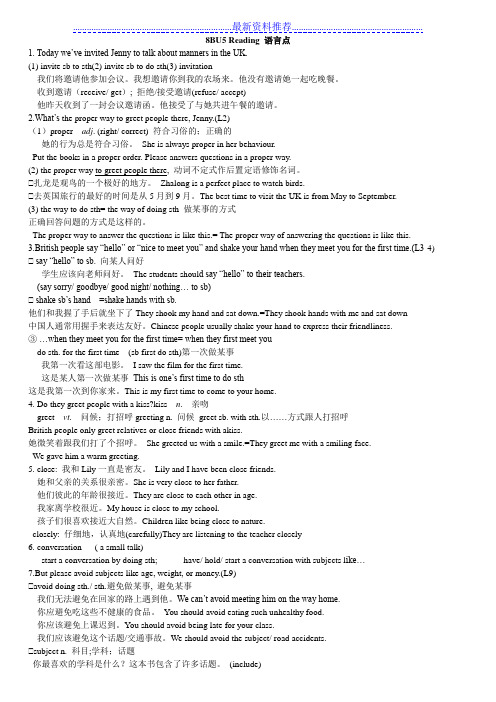
8BU5 Reading 语言点1. Today we’ve invited Jenny to talk about manners in the UK.(1) invite sb to sth(2) invite sb to do sth(3) invitation我们将邀请他参加会议。
我想邀请你到我的农场来。
他没有邀请她一起吃晚餐。
收到邀请(receive/ get); 拒绝/接受邀请(refuse/ accept)他昨天收到了一封会议邀请函。
他接受了与她共进午餐的邀请。
2.What’s the proper way to greet people there, Jenny.(L2)(1)proper adj. (right/ correct) 符合习俗的;正确的她的行为总是符合习俗。
She is always proper in her behaviour.Put the books in a proper order. Please answers questions in a proper way.(2) the proper way to greet people there, 动词不定式作后置定语修饰名词。
扎龙是观鸟的一个极好的地方。
Zhalong is a perfect place to watch birds.去英国旅行的最好的时间是从5月到9月。
The best time to visit the UK is from May to September.(3) the way to do sth= the way of doing sth 做某事的方式正确回答问题的方式是这样的。
The proper way to answer the questions is like this.= The proper way of answering the questions is like this.3.British people say “hello” or “nice to meet you” and shake your hand when they meet you for the first time.(L3-4) say “hello” to sb. 向某人问好学生应该向老师问好。
八年级下册英语(苏教版八年级)8BU6-Grammar-语言点教学内容
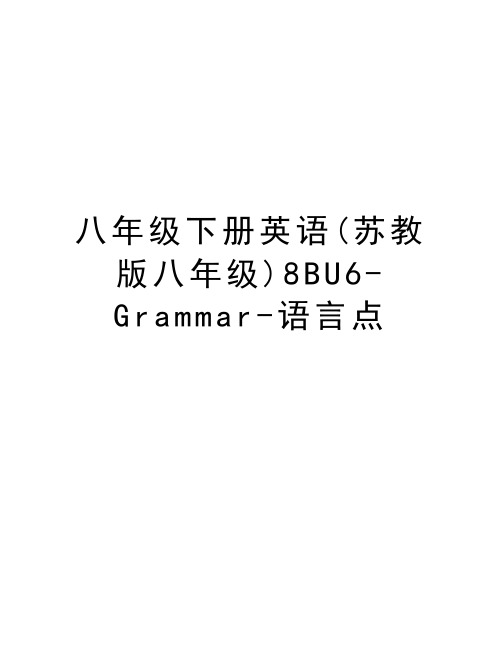
八年级下册英语(苏教版八年级)8B U6-G r a m m a r-语言点8BU6 Grammar 语言点语法要点:It is + adj + to-infinitive 做某事是…该句型中的形容词表示不定式所具备的特征或客观情况。
•It is +adj.+ for sb to do sth. 对某人来说,做某事是…•It is +adj. + of sb to do sth 某人做某事是(某人是….)该句型中的形容词描述的是人的特征、品质等。
It is +adj.+for sb+to do sth. 基本同‘It is +adj.+to do sth’,意思是:“对某人来说,做某事是......”=Doing/To do sth. is +adj.=It is +adj. +that-clauseIt is important for us to learn English well. =To learn /Learning English well is important for us.=It is important that we learn English well.常用的形容词有important,necessary,possible,difficult,easy,interesting,helpful...等,这里的形容词是对所做事情的好坏的性质的说明、修饰。
Difficulties: It’s +adj.+for sb.+to do sth./ It’s +adj.+of sb. +to do sth.相同点: for &of 后的人称代词都用宾格不同的:①...for sb.的句型通常使用表示客观情况的形容词;...of sb. 的句型一般主观感情、人物性格的形容词。
② ...for sb.则可转换成Doing/To do sth.is +adj; 而...of sb.句型可转换成Sb+be+adj+to do sth . It’s kind of you to help me with my English.=You are kind to help me with my English.用‘for’ or ‘of’填空:.1.It is really nice _____ you to help me work it out.2.You are under 18 years old, so it is impossibles _____ you to join the army.3.It is wise _____ you to take enough water.4.It is meaningful _____ everyone to join the Tree Planting Club.5.It is important _____ you to get there on time.6.It is kind _____ Millie to raise money for the poor.7.It is careless _____Simon to make the mistake.8.It is helpful _____ Andy to organize the charity show.语言点:1. donate ... to ... 捐……给…… donate money to charities给慈善机构捐钱donate blood to people in need 给有需要的人献血e.g. It’s kind of you to donate these clothes to Project Hope.你把这些衣服捐给希望工程真善良。
八下英语第五单元grammar知识点

八下英语第五单元grammar知识点全文共6篇示例,供读者参考篇1Title: Unleashing the Power of Grammar: Unit 5 Secrets Revealed!Ahoy, grammar adventurers! Brace yourselves for an exciting journey through the uncharted waters of Unit 5 in your Grade 8 English textbook. Get ready to hoist the sails and embark on a linguistic voyage like no other!First things first, let's talk about the mighty verb tenses. These little guys are the backbone of every sentence, telling us whether an action happened in the past, present, or future. Imagine you're a time traveler, hopping from one era to another. The verb tenses are your trusty companions, helping you navigate through the different time periods with ease.Speaking of time, let's dive into the past perfect tense. This tense is like a superhero cape that gives you the power to talk about actions that happened before a specific point in the past. For example, "I had finished my homework before my friendcalled." It's like rewinding a movie and hitting pause at the perfect moment!Now, let's turn our attention to the present perfect tense. This tense is a real globetrotter, allowing you to express experiences or actions that started in the past and are still relevant in the present. "I have visited many countries," you might say, as you proudly display your collection of souvenirs from around the world.But wait, there's more! The future perfect tense is a true visionary, helping you talk about actions that will be completed by a specific time in the future. "By the time the rocket launches, the astronauts will have trained for years." It's like having a crystal ball that lets you glimpse into the future!Next up, we have the tricky little rascals called modal verbs. These guys are like superheroes with special powers, adding shades of meaning to your sentences. "Can" expresses ability or possibility, while "must" emphasizes obligation or necessity. Imagine a superhero with the ability to fly and another who can move objects with their mind – that's the kind of versatility modal verbs bring to the table!Now, let's talk about the stealthy ninjas of grammar –passive voice. These sneaky sentences put the focus on theaction itself, rather than the doer. "The letter was written by the president" is an example of passive voice, where the action (writing the letter) takes center stage. It's like a magic trick where the magician disappears, and all you see is the floating card!Last but not least, we have the fearless warriors known as conditionals. These mighty sentences allow you to explore hypothetical situations and their potential consequences. "If I won the lottery, I would buy a private island." It's like having a secret portal that transports you to alternate realities!Phew, that was quite a linguistic odyssey, wasn't it? But fear not, grammar adventurers! With these powerful tools in your arsenal, you'll be unstoppable in your quest to conquer the English language. So, grab your grammar swords, put on your verb tense armor, and let's embark on new adventures together!篇2Grammar Buddies: Cracking the Code of Unit 5!Hey there, grammar gurus! It's me, your trusty Grammar Buddy, ready to take you on an exciting adventure through the world of grammar. Today, we're going to explore the fascinating realms of Unit 5 in our 8th grade English textbook. Get ready tounlock the secrets of grammar and become true masters of the English language!First up, let's talk about noun clauses. These little guys are like super-powered sentences that can act as subjects, objects, or even complements in a bigger sentence. They're introduced by words like "that," "what," "who," "which," and so on. For example, "What you said made me laugh" – see how "what you said" is a whole clause acting as the subject? Pretty cool, right?Next, we have adjective clauses. These bad boys describe nouns by giving us extra information about them. They usually start with relative pronouns like "who," "whose," "which," "that," or "where." For instance, "The book that I read yesterday was hilarious." The clause "that I read yesterday" tells us more about the book. Adjective clauses are like little detectives, gathering all the juicy details about nouns.Now, let's move on to adverb clauses. These fellas tell us more about verbs, adjectives, or even other adverbs篇3Grammar Galore: Mastering Unit 5 Like a Pro!Hey there, fellow grammar gurus! Are you ready to dive into the exciting world of Unit 5's grammar points? Get ready because this is going to be a wild ride filled with mind-boggling rules, tricky exceptions, and all sorts of linguistic awesomeness!First up, let's talk about those sneaky little things called "modal verbs." You know, words like "can," "could," "may," "might," and "must." These babies help us express all sorts of cool stuff, like abilities, possibilities, and even obligations. For example, "I can juggle three oranges" means you're a total rock star at fruit juggling. But "I must study for my test" means you better hit those books or else!Next, we've got the wonderful world of "conditionals." These are like magic spells that let us talk about hypothetical situations. Like, "If I had a million dollars, I would buy a candy factory." Dreamy, right? But conditionals can also be used for real-life stuff, like "If it rains, I'll bring my umbrella." See? Super handy!Alright, now let's tackle those "relative clauses." These suckers help us add extra details to our sentences, making them way more descriptive and interesting. For instance, "The book that I'm reading is really exciting" tells us way more than just "The book is exciting." It's like giving our sentences a tasty little garnish!Moving on, we've got "reported speech" or "indirect speech." This is how we share what someone else said without using their exact words. Like, instead of saying "Timmy said, 'I love chocolate cake,'" we can say, "Timmy said that he loved chocolate cake." Easy peasy, right?Last but not least, we've got "passive voice." This is when the object of a sentence becomes the subject, and the real subject kind of disappears. For example, "The cake was eaten by Timmy" instead of "Timmy ate the cake." It's like putting the spotlight on the cake instead of Timmy!Phew, that was a lot of grammar goodness, huh? But don't worry, we're not done yet! We still need to practice, practice, practice until these rules become second nature. So, let's dive into some fun exercises and activities to really cement these concepts in our brains.First up, let's play a game of "Modal Verb Madness." I'll give you a situation, and you have to respond with a sentence using the appropriate modal verb. For example, "You want to go to the playground, but it's raining." You could say, "I may go to the playground if it stops raining." See? Easy peasy!Next, let's tackle some conditional conundrums. I'll give you the first part of a conditional sentence, and you have to completeit. For instance, "If I won the lottery..." and you could respond with something like, "If I won the lottery, I would buy a million ice cream cones!"Now, let's play a round of "Relative Clause Relay." I'll start with a sentence, and you have to add a relative clause to it. Then, I'll add another relative clause to your sentence, and we'll keep going back and forth, making our sentence longer and more descriptive with each turn!For reported speech, we can play a game of "Telephone." I'll whisper a sentence to you, and you have to repeat it using reported speech. Then, you'll whisper the reported sentence to the next person, and so on, until we've created a hilarious chain of indirectly reported madness!Finally, let's tackle passive voice with a fun little activity called "Object Spotlight." I'll give you a sentence in active voice, and you have to rewrite it in passive voice, putting the object in the spotlight. For example, "The dog chased the cat" could become "The cat was chased by the dog."Alright, grammar geniuses, you've got all the tools you need to conquer Unit 5 like a boss! So, let's keep practicing, keep playing, and keep having fun with these incredible grammarrules. Before you know it, you'll be speaking and writing like a true linguistic master!篇4Grammar Gems: Mastering Unit 5 the Fun Way!Hey there, fellow grammar explorers! Are you ready to embark on an exciting adventure through the enchanting world of Unit 5 grammar? Get ready to unleash your inner wordsmith and discover the magic hidden within these remarkable grammar treasures!Let's kick things off with a real showstopper: the wondrous world of adverbial clauses! These mighty clauses are like little linguistic superheroes, adding depth and excitement to our sentences. Imagine being able to describe when, where, why, or under what conditions something happens – talk about power-篇5Grammar Galore: Mastering Unit 5 Like a Pro!Hi there, fellow grammar geeks! It's me, your friendly neighborhood grammar guru, here to help you conquer the linguistic challenges of Unit 5 in our Grade 8 English textbook.Buckle up, because we're about to embark on a grammatical adventure that'll leave you feeling like a true wordsmith!Let's start with the big kahuna: the present perfect tense. Now, I know what you're thinking, "Present perfect? Sounds like a fancy schmancy way to talk about the present." Well, my friends, you're partly right. The present perfect tense is all about describing actions or events that started in the past but are still relevant or ongoing in the present. Think of it as a bridge between the past and the present, connecting the two in a harmonious linguistic dance.For example, let's say you've been studying English for years, and someone asks you, "How long have you been learning English?" You'd respond with, "I have been learning English for five years." Boom! Present perfect in action! See how it links the past action (starting to learn English) with the present (still learning it)? Nifty, right?But wait, there's more! The present perfect tense also comes in handy when you want to talk about experiences or achievements in your life. Imagine you're chatting with a friend, and they ask, "Have you ever been to Disneyland?" You can proudly proclaim, "Yes, I have been to Disneyland twice!" That'sthe present perfect tense working its magic, allowing you to share your past experiences in a present context.Now, let's move on to another grammatical gem: the present perfect continuous tense. This one's all about actions or situations that started in the past, are still ongoing in the present, and might continue into the future. Think of it as the present perfect's cooler, more dynamic cousin.Let's say you're working on a massive art project, and your mom walks in and asks, "What have you been doing?" You can reply, "I have been painting a mural for the school art show." See how the present perfect continuous tense conveys the idea that you started painting in the past, are still painting in the present, and might continue painting in the future? It's like a linguistic time machine, capturing the past, present, and future in one neat little package.But wait, there's more! We haven't even scratched the surface of the grammatical goodness that Unit 5 has to offer. Brace yourselves, because we're about to dive into the world of relative clauses!Relative clauses are like little descriptive ninjas, sneaking in extra information about nouns or pronouns to make yoursentences more detailed and interesting. They're introduced by relative pronouns like "who," "which," "that," and "whose."For example, let's say you're describing your favorite superhero. You could say, "Batman, who fights crime in Gotham City, is my favorite superhero." See how the relative clause "who fights crime in Gotham City" provides additional details about Batman? It's like a linguistic secret sauce, adding flavor and depth to your sentences.And let's not forget about the mighty gerund! Gerunds are verbs that have been transformed into noun-like creatures, often ending in "-ing." They're like the shape-shifters of the grammar world, able to take on different roles and functions within a sentence.Imagine you're chatting with a friend about your hobbies, and you say, "Swimming is my favorite way to exercise." In that sentence, "swimming" is a gerund, acting as the subject of the sentence. Gerunds can also be objects, like in the sentence "I enjoy reading books." Pretty versatile, right?Phew! That was a lot of grammatical goodness to take in, but don't worry, you're well on your way to becoming a Unit 5 master. Just remember, practice makes perfect, and before youknow it, you'll be wielding these grammar rules like a linguistic samurai.So, keep studying, keep practicing, and most importantly, have fun with these grammatical gems. After all, language is a beautiful tapestry, and each grammar rule is a thread that helps weave it together. Embrace the challenges, revel in the victories, and never stop exploring the wondrous world of words!篇6Certainly! Here's an article on the grammar points covered in Unit 5 of the 8th-grade English textbook, written in astudent-friendly tone, with a length of approximately 2,000 words.Grammar Points: Unit 5Hey there, fellow students! It's time to dive into the exciting world of grammar once again. In this unit, we'll explore some cool new grammar concepts that will help us communicate like true English champs!Let's kick things off with a topic that's sure to。
- 1、下载文档前请自行甄别文档内容的完整性,平台不提供额外的编辑、内容补充、找答案等附加服务。
- 2、"仅部分预览"的文档,不可在线预览部分如存在完整性等问题,可反馈申请退款(可完整预览的文档不适用该条件!)。
- 3、如文档侵犯您的权益,请联系客服反馈,我们会尽快为您处理(人工客服工作时间:9:00-18:30)。
8BU5 Grammar语言点关键点:be + adj +enough to do sthbe + adj + enough for sb to do sth= be so +adj that sb can/ could do sthbe too +adj + (for sb) to do sth= be so +adj that sb can’t/ couldn’t do sth= be not +adj(反义词) (for sb) to do sth一.复习:1. 在那里,什么是符合习俗的问候方式?2. 英国人在家也很有礼貌。
3. 我肯定这些对我们很有帮助。
4. 他们会足够有耐心地等你挪开。
二填空:()1. It is not very big, but there are ______ ____ (snack) in it.2. There is always more than _______ ______(food) there.3. Soon Alice ______ _______ _______ _____ ______ (small, go) through the door.4. …but she was ______ small ______ reach the key.5. He _____ ______ ______ ______ ______ (brave, save) his neighbour from a fire.6. As a result, the birds do not have _______ _______ (food) to eat.7. There was not _______ ______ (space) for Timmy to pull himself through.8. You _____ ______ ______ _____ ______ (old, learn) about manners now, Hobo.9. You are never ______ old ______ learn.10. If you are in their way, British people will _____ ______ _______ ______ ______ (polite, wait) till you move.三、同义句转换1. The little girl is too short to reach the orange on the table.The little girl isn’t ______ ______ to reach the orange on the table.2. David is curious. He asks his parents many questions every day.David is ______ ______ ____ ___ his parents many questions every day.3. Kitty is clever enough to make all kinds of kites.Kitty is ___ ______ _____ she____ ____ all kinds of kites.4.Andy is too weak to carry the big box.Andy is ___ _____ _______ to carry the big box.Andy is ___ ______ ____she______carry the big box.5. It’s very kind of you to tell me this news.You are _____ ______ to tell me this news.5. This problem is too difficult for her to work out.This problem is ______ ______ ______ _______ _______ ______ ____ ________.6. David is very nervous. He can’t answer this question right now.David is ___ ______ __ __ this question right now.David is ___ ______ __ he ___ ___ this question right now.7. Amy is very careless. She can’t find her glasses on her desk.Amy is ___ ______ __ __ her glasses on her desk.Amy is ___ ______ __ she ___ ___ her glasses on her desk.8. Tom is very clever and often gets good marks in his exams.Tom is ______ _______ ______ get good marks in his exams often.9. Amy is so easy-going that she can make friends easily.Amy is _________ __________ _______ to make friends easily.10. The bag is too heavy for the old man to carry.The bag is ______ light ______ for the old man to carry.11. The math problem isn’t easy enough for me to work out.The math problem is ______ ________ for me ______ work out.12. Lin Dan played badminton very well. He won the Thomas Cup again.(合并为一句)Lin Dan played badminton well _______ ______ win the Thomas Cup again.四. 单项选择。
1. This movie wasn’t . He fell asleep half way through it. (2013广西贺州)A. interesting enoughB. enough interestingC. interested enoughD. enough interested2.Lucy isn’t old enough to carry the box. (2012贵州黔西南州)A. is so young that she canB. isn’t young enough toC. is too young toD. is so young to3. Billy has all kinds of different ideas. He is ______ to be a famous writer. (2008宿迁)A. enough creativeB. creative enoughC. energetic enoughD. enough energetic4. Simon is _______to make us all _______. (2007无锡)A. enough funny; laughB. funny enough; laughC. enough funny; to laughD. funny enough; to laugh5. I find this computer game _______ to play. (2009无锡)A. enough easyB. easy enoughC. enough easilyD. easily enough五. 翻译下列句子。
1.我有足够的钱买这本书。
2.你有足够的时间来做这件事。
3.这个够好吗?4.六瓶应该够了5.你等了好长时间而不生气真有足够的耐心。
6. 你够大的可以学习有关礼貌的知识了。
7.他太累了,不能继续工作。
8.英国人太有礼貌了,不会在公共场合大声笑。
9.他太累了,不能再往前走了。
10.她太穷了,买不起这么贵的衬衫。
11.盒子太重了,这个男孩搬不动。
12.苹果放得太高了,这个孩子够不着。
13.他够上学年龄了。
14. 她真慷慨,为我们买了这多礼物。
15. 昨天他太兴奋了,都不能清楚表达自己了。
16. 这男孩年龄太小,不能照顾自己。
17. 他们太慢了,赶不上这辆公交车了。
18. 这个女孩胆子不够大,不敢靠近那只狗。
19. 这房子对我们来说不够大。
20. 你的钱够吗?21 这房子太小了,五个人住不下。
22.教室里太吵了我不能认真学习。
23.市中心太远了我们不能走着去。
24.他太懒了不能早起。
25.我们太忙不能按时完成这项任务。
26.他个头高,可以够到篮筐。
27.天气够暖和,可以游泳了。
28.这本书足够简单,他可以读懂。
29.他跑得飞快,很快赶上了我们。
30.我吃饱了,谢谢你。
31.他说得太快,以至于我们不能理解。
32.茶太烫了,我没法喝。
33.他年纪太小,不会读也不会写。
34.虽然这些书很重,但他足够健壮,可以搬动它们。
35.他们足够勇敢来面对地震带来的伤害。
36. 我们去机场有足够的时间。
37.玛丽的头发够长了。
38.这些蛋糕足够了,非常感谢。
39.父母经常说我们太年轻,不能自己做决定。
40.我的汤太烫,没法喝。
(hot)六. 语言点:1. discussion n.讨论在他们的争论中,我支持李先生。
In their discussion, I was in favor of Mr. Li.昨天就这个话题我们进行了讨论。
We had a discussion on/about this topic yesterday.他们正在进行有关她健康问题的讨论。
They are having a discussion on /about her health problem. 2. He did not express himself clearly.express v.表达n expression(s)作者在小说中表达出他对祖国的爱。
The writer expresses his love for his motherland in his novels.你要表达什么?What do you want to express?他从来不怕表达自己的观点。
